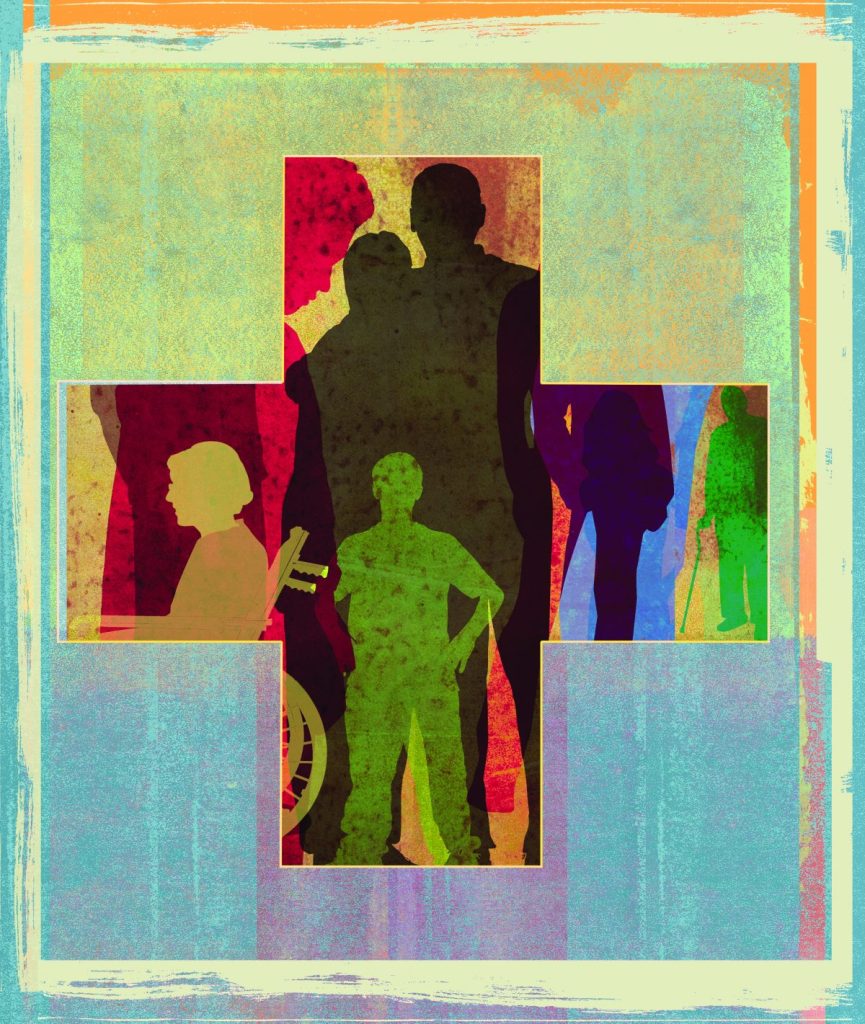Recently I have been looking at photos of myself from five years ago. At 41, I was living the good life in Europe, with a handsome income and a penthouse in Berlin’s diplomatic quarter. My days were filled with challenging and satisfying work, friendship, and the company of an attentive partner, and I enjoyed long, leisurely vacations—a staple of European employment benefits.
As a resident in Germany, I had comprehensive health care, too. This is particularly noteworthy because in the fall of 2012, I learned I had early-stage breast cancer. As devastating as this news was, I happened to be working for an international cancer research foundation at the time. I had the world’s medical experts at my fingertips and supportive colleagues. I was clearly in the right place at the right time.
Despite all of these advantages—including not having to worry about medical bills or taking time off work for treatment and doctors’ appointments, the early stage of the tumor, and a favorable prognosis—the diagnosis haunted me. In the weeks that followed, I felt as though I was having a lovers’ quarrel with God. Before cancer, I seemed to have been walking around thinking I would live forever. I thought I had time.
I’ve now been cancer-free for five years. Nonetheless, those dark days surrounding my diagnosis and treatment remain etched in my memory, and I recall how tender the world suddenly felt to me. After I learned of my cancer, I contacted Shasta Abbey, a Buddhist monastery in the Serene Reflection Meditation (Soto Zen) tradition in northern California. I had visited the abbey some months prior as a journalist and tourist. But now suddenly I was a very ill—and very frightened—person. Matters of life and death, I reasoned, are the bailiwick of the monks I’d met briefly there. I was desperate during that initial phone call, raging against what I perceived as a threat and an injustice. One of the monks listened as I flailed about, furious at my fate. And then he responded with just two sentences.
“We are all going to die someday,” he told me. “So just do the best you can.” Friends later told me they thought this instruction was either trite or heartless, or both. On the face of it, that may well have been so. But I somehow recognized that there really wasn’t more to say. In effect, the monk’s words grounded me when nothing else would. As I prepared for surgery and met with doctors to discuss treatment options, the monk’s words became my quiet mantra. Six months later, I participated in an introductory retreat at Shasta.
I recall this all now, too, because of the daily political dialogue in the United States over health care. I moved back to the U.S. in 2014, after nearly 15 years in Europe, to be near my aging mother, who had been diagnosed with Alzheimer’s disease and then shortly afterward had suffered a severe stroke. I care for her part-time, and so reflections on illness and death regularly occupy my mind, just as they did five years ago. I often think back to how universal health care in Germany allowed me to focus on one thing only: recovery. My insurance even paid for a six-week health resort stay and regular appointments with an oncotherapist, whose job it was to get me mentally back on my feet. Yet even with all of those resources at hand, I struggled and stumbled mightily with precisely that. I wonder to myself how I might have fared without them.
Reverend Master Jiyu-Kennett, the founder of Shasta Abbey, used to say that in Buddhism, there is no savior—you save yourself. Or, as Reverend Koten Benson, one of Rev. Master Jiyu-Kennett’s disciples, has put it: you must do something about yourself. In this era in the United States, one where many lack comprehensive health care, you could misunderstand the Buddhist perspective as advocating for a radical self-reliance: simply meditate your way through trauma and illness.
Before meditating, we pay homage to what’s traditionally known as the three jewels, which buttress our practice: the Buddha; the dharma, or the teachings; and the sangha, or the community. This last tenet, I believe, speaks to the idea that self-reliance can manifest only when we ourselves are in good health—we aren’t meant to go at it alone. Like calling upon the three jewels for spiritual support, implementing universal health care would create a basis of material and emotional support from which citizens could solve other pressing personal and social problems. Personally, I know that the privileged health care I received in Germany five years ago was invaluable.
All that being said, the fact remains: We are all going to die someday. Indeed, what brought the Buddha to his own spiritual quest was his encounter with this very fact. So while I firmly believe that a moral society insures all its citizens’ health, I have also come to learn, through Buddhist practice, to do the best I can in caring for my own well-being and that of my mother and others, no matter what political winds are blowing. For now, that means ensuring the rest of my mother’s life is spent in as much dignity and comfort as possible: taking her for short walks in the garden, sharing mango milkshakes, clipping her fingernails, massaging her feet, and settling into the moments that make up this extraordinary, difficult time.
Thank you for subscribing to Tricycle! As a nonprofit, we depend on readers like you to keep Buddhist teachings and practices widely available.
